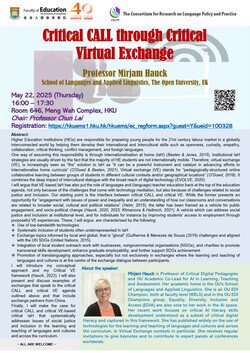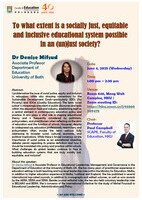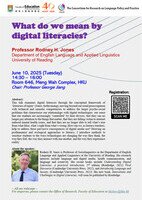Seminar: Critical CALL through Critical Virtual Exchange
Seminar
Date
May 22, 2025 (Thu)
Venue
Time
4:00 PM - 5:30 PM
Speaker

Critical CALL through Critical Virtual Exchange
Professor Mirjam Hauck
School of Languages and Applied Linguistics
The Open University, UK
May 22, 2025 (Thursday)
16:00 – 17:30
Room 646, Meng Wah Complex, HKU
Chair: Professor Chun Lai
Abstract:
Higher Education Institutions (HEIs) are responsible for preparing young people for the 21st century labour market in a globally interconnected world by helping them develop their international and intercultural skills such as openness, curiosity, empathy, collaboration, critical thinking, conflict management, and foreign languages.
One way of assuming this responsibility is through internationalisation at home (IaH) (Beelen & Jones, 2015). Institutional IaH strategies are usually driven by the fact that the majority of HE students are not internationally mobile. Therefore, virtual exchange (VE), is increasingly seen as “the” solution to IaH as “it can be a powerful instrument and catalyst in advancing efforts to internationalise home curricula” (O’Dowd & Beelen, 2021). Virtual exchange (VE) stands for “pedagogically-structured online collaborative learning between groups of students in different cultural contexts and/or geographical locations” (O’Dowd, 2018). It combines the deep impact of intercultural dialogue with the broad reach of digital technology (EVOLVE, 2020).
I will argue that VE-based IaH has also put the role of languages and (language) teacher education back at the top of the education agenda, not only because of the challenges that come with technology mediation, but also because of challenges related to social justice and inclusion. Our starting point is the interface between critical CALL and critical VE. While the former presents an opportunity for “engagement with issues of power and inequality and an understanding of how our classrooms and conversations are related to broader social, cultural and political relations” (Helm, 2015), the latter has been framed as a vehicle for public engagement, and socio-political change (Hauck, 2020, 2023; Klimanova & Hellmich, 2021). A vehicle which can address social justice and inclusion at institutional level, and for individuals for instance by improving students’ access to employment through purposeful VE experiences. These, I will argue, are characterised by the following:
- Use of low-bandwidth technologies
- Systematic inclusion of students often underrepresented in IaH
- Exchange topics informed by local and global, that is “glocal” (Guilherme & Menezes de Souza (2019) challenges and aligned with the UN SDGs (United Nations, 2015)
- Integration of local student outreach work with businesses, nongovernmental organisations (NGOs), and charities to promote transversal skills development, enhance graduate employability, and further support SDGs achievement
- Promotion of translanguaging approaches, especially but not exclusively in exchanges where the learning and teaching of languages and cultures is at the centre of the exchange dialogue between participants.
I will introduce my conceptual approach and my Critical VE framework (Hauck, 2023). I will also present and discuss examples of exchanges that speak to the critical CALL and critical VE agenda outlined above and that include exchange partners from China.
Finally, I will make the case for critical CALL and critical VE-based critical IaH that systematically addresses issues of social justice and inclusion in the learning and teaching of languages and cultures and across the curriculum.
About the speaker:
Mirjam Hauck is Professor of Critical Digital Pedagogies and OU Academic Co-Lead for AI in Learning, Teaching and Assessment. Her academic home is the OU's School of Languages and Applied Linguistics. She is an OU EDI Champion, both at faculty level (WELS) and in the OU EDI Champions group. Equality, Diversity, Inclusion and Access (EDIA) are also core to her work in the AI space. Her recent work focuses on critical AI literacy skills development understood as a subset of critical digital literacy and captured in this framework. She has published widely on the use of technologies for the learning and teaching of languages and cultures and across the curriculum, in Virtual Exchange contexts in particular. She receives regular invitations to give keynotes and to contribute to expert panels at conferences worldwide.
~ All are welcome ~



